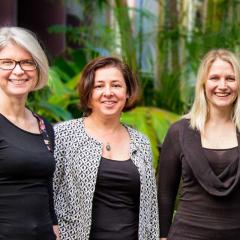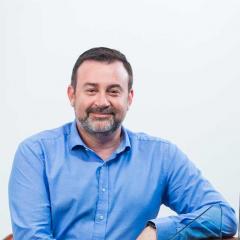With a global push to legalise the medicinal use of cannabis, UQ’s Professor Wayne Hall has been in high demand to deliver presentations and contribute his expert comment to shape key policy documents.
“The topic of cannabis is one that everyone wants to talk about at the moment for understandable reasons. I have had a lot of interest in medicinal cannabis as well as the adverse effects of cannabis, particularly the mental health effects,” Professor Hall said.
“Currently I’m writing a briefing document for European policymakers on what we know about medicinal cannabis, the evidence on its effectiveness and what the advantages and disadvantages of different ways of allowing patients to use medicinal cannabis are.
“This year I have travelled to the UK to advise the government on their decisions to give patients access to cannabis in exceptional circumstances and to The Netherlands to present on global trends in cannabis policies and the repercussions they might have on the Dutch policies.”
As one of the world’s most highly cited social scientists and after three decades in the addiction research field, it is understandable why Professor Hall is a key adviser for governments worldwide on cannabis policies. Since 2012 Professor Hall has published more than 250 papers, book chapters, editorials, commentaries and other works and has given more than 80 invited presentations and lectures to leading conferences and research groups in the USA, UK, Canada, Europe, Singapore and New Zealand.
Before Professor Hall made the career change to researching addiction he was a senior lecturer in the School of Psychiatry at the University of New South Wales (UNSW).
“There was very limited academic interest in the addictions field in Australia among psychiatrists at that time. The move was seen by some of my very senior colleagues as the end of my career and as a really dumb thing to be doing,” Professor Hall said.
Professor Hall was recognised by the British Society Study of Addiction (SSA) when he was invited to give a guest lecture and was featured in a video interview with SSA Director Professor John Stang published online. In the video Professor Stang said: “I think many of us are really pleased you did that dumb thing of moving into the field.”
The career accolades Professor Hall has achieved in the fields of addiction, mental health and public health have been significant and exceptional. In Australia the impact Professor Hall has had on addiction policy was recognised when he was appointed to the Australian Advisory Council on the Medicinal Use of Cannabis.
“What started out in 1992 as a request by the Australian Government for a quick review on the adverse health effects of cannabis turned into a 100,000 word monograph. It’s a topic which I’ve been dragged back to repeatedly,” Professor Hall said.
“Because of the review I was invited to speak at a conference on cannabis in New Zealand in 1993 and this led to an invitation to participate in a World Health Organization (WHO) update of a 1983 report on the health effects of cannabis.
“I was later invited to write a review for The Lancet and since then I have received regular invitations to speak or write on this topic. I was also invited to participate in the most recent WHO update about the adverse health effects of cannabis.
“I would have to say the invitations to be an Honorary Professor at the Institute of Psychiatry, Psychology and Neuroscience in the King’s College of London and the London School of Hygiene and Tropical Medicine at University College London, were pinnacle career moments for me.
Both institutions are global leaders in drug and addiction research, so it was an honour to be asked to contribute to their research activities.”
Cannabis legalisation for medicinal and non-medicinal use has always been a controversial topic with public opinions shifting over time. Professor Hall has avoided taking strong views for or against medicinal or recreational use but the perception of his views has changed with shifting community views.
“In the past I have been criticised as being a closet drug legaliser and now I find myself characterised by the cannabis legalisation lobby group as an ‘anti-cannabis campaigner’, although my views have not changed radically,” Professor Hall said.
“I used to be criticised for saying that ‘cannabis wasn’t as dangerous as alcohol’ because this was regarded as advocating for legalisation. Now I’m saying that though this is the case cannabis use isn’t harmless and there is a downside to legalisation.
“The shift has been surprisingly rapid. Five or six years ago there wasn’t a lot of public support but this has changed since the legalisation of medicinal use of cannabis in Colorado and the Washington State in 2014 and Canada in October this year. There is a lot of discussion about how these policies will develop and if legalisation will spread beyond the US and Canada and into Europe and Australasia.
“It’s important that we get the correct information out there about the effects of cannabis use and that more trials are done to assess the safety and efficacy of various medicinal uses of cannabis.”
Between UNSW and UQ where Professor Hall has been a Professor for the Centre for Youth Substance Abuse Research and served as Inaugural Director (2014-16), he has supervised 20 research students.
“I really enjoy working with bright young people who are interested in the addiction field. They have all been really productive and happy to take on suggestions and pursue areas further. Ten students I have worked with have become full professors.”
When asked for advice he would give young students and researchers Professor Hall said ‘share your research with a broader audience than one’s peers by learning how to write in an accessible way‘.
“I have also found it useful to read widely, especially in adjacent fields, in search of new ideas and research methods, and when entering new fields it is essential to collaborate with people who know more than you do about the field.”
Words: Kirsten O’Leary



